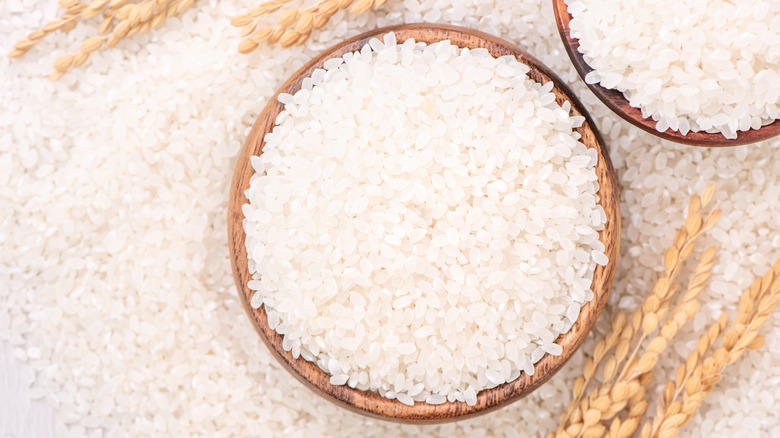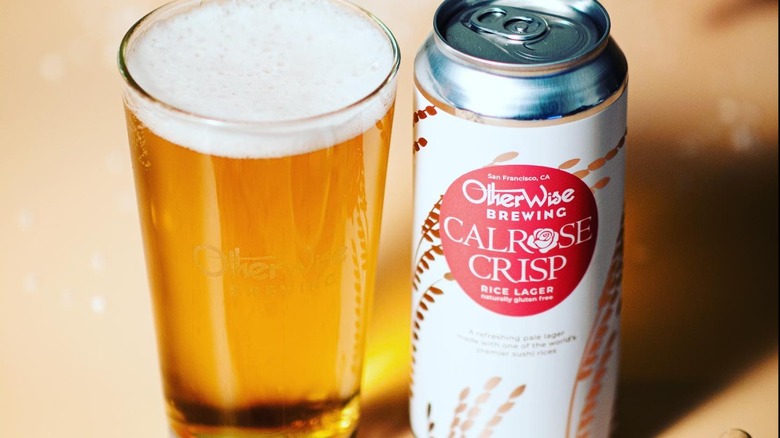Why Rice Beer Isn't Actually The Best Choice For A Gluten-Free Brew
There's never been a better time to be a beer lover if you are gluten-sensitive or gluten-intolerant. These days, gluten-free beer isn't too hard to come by and there are a number of breweries dedicated specifically to making delicious — and celiac-safe — gluten-free brews. Some of these dedicated gluten-free breweries have even earned national recognition. Most beer is a hard no for anyone with celiac disease or other issues processing gluten, as beer is typically made from a mix of grains that usually includes barley and wheat. Both of those grains contain the offending protein.
Barley and wheat aren't the only ingredients used as the malt for beer, however. Rice is another fairly common base. As anyone who avoids gluten probably knows, it's a gluten-free grain. So you might be wondering — does that mean rice beers are safe for folks with celiac and other types of gluten sensitivity?
The answer is actually not usually. While there are a number of popular commercial beers that use rice as a minor or major component of the malt, very few use rice exclusively. They often include some component of wheat and/or barley. So, while the best-known Japanese import beers like Sapporo, Asahi, and Kirin all utilize rice, none of them are gluten-free. Thanks to the ever-inventive world of craft beer, though, there are some gluten-free rice beers on the market. Just be sure to check labels dutifully before imbibing.
Rice beer can be misleading for people concerned with gluten
All beer has four main ingredients: malt, hops, water, and yeast (plus any adjuncts like fruit or spices). "Malt" refers to any cereal grain that's been malted, which means it's soaked in water and then dried with hot air to reach a specific point of germination. Barley is the most common malt base. Wheat, rice, and other grains like buckwheat and sorghum are typical as well. Many beers use a blend of different grains: Budweiser, for example, uses barley as well as rice. Beers made with rice tend to have a light, delicate quality to them, with some mild sweetness.
You're unlikely to find many beers made with 100% rice-based malt because without the enzymes contributed by barley and wheat, it's hard for brewers to achieve the flavor complexity and robust carbonation beer drinkers look for. That's why most rice beers you'll find are not gluten-free. They typically contain some amount of barley or wheat to help develop flavor and structure.
Which rice beers are gluten free?
Don't assume a beer is gluten-free just because it mentions rice on the label. As always when it comes to food sensitivities, seek out beers that are explicitly labeled gluten-free (or gluten-reduced, if you can tolerate gluten in small quantities). Whenever possible, get your information from the manufacturers, as bottle shops and internet users sometimes mislabel rice beers as gluten-free when they aren't.
Many gluten-free beers are made with a blend of grains that includes rice, along with others like sorghum, quinoa, millet, and buckwheat. You can find gluten-free beer in a variety of styles. Unfortunately (and perhaps counterintuitively) rice-forward styles like Japanese rice lagers are difficult to find without gluten.
There is one exception we were able to find: Calrose Crisp is a rice lager made exclusively with sushi rice malt by California-based Otherwise Brewing, a dedicated gluten-free brewery.
If you're just looking for gluten-free beers that include rice, you can cast a wider net. Of the 20+ dedicated gluten-free breweries currently open in the U.S., many of them include rice malt as an ingredient in their core brews. Outside of those, there are companies like Omission Brewing, dedicated to making gluten-reduced beer.


